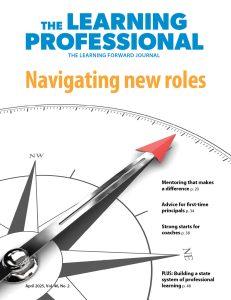The federal Title IIA grant program supports the professional growth and expertise of about 2 million teachers annually, and those dollars matter a lot to states and districts working to improve teacher and leader quality and, ultimately, increase student success.
As champions for Title IIA and the critical work it supports, Learning Forward holds policy forums where districts and state leaders share how they have designed their Title IIA-supported programs and the successes they have documented. Hillsborough County Public Schools has for several years used some of its Title IIA dollars for an instructional coaching program embedded in high-needs schools that can’t access other federal program funding, such as Title I. This large Florida district located in Tampa educates a diverse student population of about 225,000.
Jamalya Jackson, Hillsborough County Public Schools’ executive director of professional learning, said the district has three strategic priorities when allocating its Title IIA dollars: (1) high-quality professional development aligned with state academic standards; (2) teacher leadership and professional growth, including teacher and leader induction, building teacher capacity at school sites, and offering meaningful pathways to teacher leadership; and (3) supporting teachers working with high-needs students. The district received $9 million in Title IIA funds this year. Jackson’s comments were part of an April 2024 Learning Forward Title II webinar.
For the past several years, Hillsborough County has identified a cadre of its non-Title I schools with “C” grades that are good candidates for additional instructional support because with it, they could achieve a “B” or an “A” grade. Without it, they are at risk of dropping further.
Florida schools receive letter grades to measure the performance of each school, based on components that when scored together, demonstrate how well each school serves its students. Every year the state gives each public K-12 school an A through F letter grade. How the state measures school grades has undergone substantial modification in recent years, with the adoption of progress monitoring assessment standards. State school grades for 2022-23 reflect standards and tests that had not been used in previous school assessments.
For a group of its C-graded schools, Hillsborough County Public Schools deployed a portion of its Title IIA allocation to develop a professional learning program centered around what it calls Teacher Talent Developer, expert educators who spend half their time as classroom teachers and half their time providing instructional coaching to other teachers. This model provides more teaching staff while supporting existing staff to be as effective as possible.
Teacher Talent Developer program has demonstrated positive impact in Hillsborough County’s efforts to improve school performance grades, with many schools moving from C grades to As and Bs. The program has also received high satisfaction marks from the schools, reporting that educators felt more supported and also appreciated opportunities for increased teacher leadership.
“When we were trying to be very strategic about allocating the funds, we began to consider this notion that we have a group of schools that were non-Title I, but they were what we were calling our ‘fragile Cs and our borderline Bs,’” Jackson said. “At any point they could go up or down. But we also noticed these were many of the school that did not have any additional full-release positions, such as a literacy coach or a math coach, or any of those types of positions that could support the growth of teachers in order to meet the needs of students.” She said the strategic investment of Title IIA funds in increased site-based professional learning in high-needs schools is well-received as school leaders indicated they would like to see the program stick around, even after their school’s grade improves.
Teacher Talent Developer – a school-embedded resource for improved instruction
Teacher Talent Developers’ specific duties are:
- Provide instructional coaching to all classroom teachers to improve instruction
- Plan, model, and co-teach standards-based lessons
- Design and deliver high-quality professional learning aligned to instructional priorities
- Conduct non-evaluative observations and provide feedback to instructional personnel
- Provide follow-up and/or implementation support to site-based professional learning activities.
Jackson was quick to point out that the instructional coaching is not a “deficit” approach – it is designed to lift up and enhance all of the school’s teaching and learning.
“One of the biggest things that we lean on the Teacher Talent Developers for is providing that follow-up and implementation after a site-based professional learning activity,” Jackson said. “We know the importance of that ongoing feedback and implementation – it’s not a one and done. These individuals are critical to that initiative.”
What the Teacher Talent Developer program data shows
After the first year of Teacher Talent Developer in 2021-22, half of participating schools (11 out of 22) increased their performance grade. In addition, 10 maintained their grade and only one school dropped a grade.
In 2022-23, of 17 schools, one school achieved a higher grade, 12 stayed the same, and four dropped down. Jackson said considering the changes to Florida’s school grading system that year, the fact that 12 Hillsborough schools participating in Teacher Talent Developer program were able to maintain their performance grades in 2022-23 is a sign of success.
The goal for all the participating schools was achieving an A grade. When a school sustains that grade for two years, the Teacher Talent Developer position goes away. Jackson said the schools improve themselves out of needing these positions. “The cadre of schools that have this position is fluid,” she said.
Jackson said Title IIA is a critical program for funding continuous improvement, and educators need to be able to rely on it without threat of program interruption.
Learning Forward has reported that the U.S. House Appropriations Committee in July approved an education funding bill that would zero out funding for Title II-A in fiscal year 2025 should it become law. Learning Forward expects the U.S. Senate appropriations subcommittee to submit a 2025 Labor HHS Education bill later this summer that will level-fund Title IIA at $2.1 billion for FY 2025.
“As a person with their boots on the ground every day, protecting this as a stable funding source is critical,” Jackson said.
Link for additional learning
Resources from Learning Forward’s 2024 Title II: Opportunities and Impact learning session









